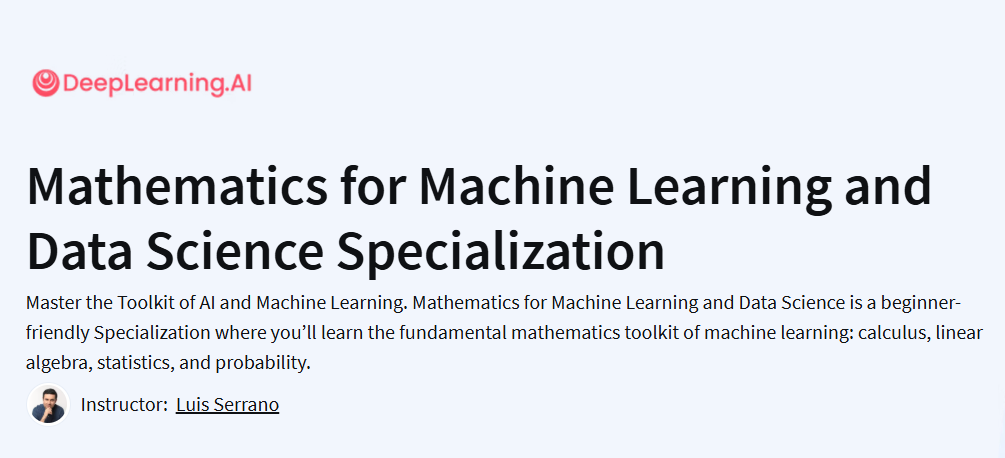What you will learn in Mathematics for Machine Learning and Data Science Specialization Course
This specialization offers a comprehensive introduction to the mathematical foundations essential for machine learning and data science, covering linear algebra, calculus, probability, and statistics.
Learners will gain hands-on experience applying mathematical concepts using Python programming in interactive lab exercises.
The courses emphasize intuitive understanding through visualizations, enabling learners to grasp complex mathematical ideas effectively.
By the end of the program, students will be equipped to understand and implement machine learning algorithms with a solid mathematical foundation.
Program Overview
Linear Algebra for Machine Learning and Data Science
⏱️ 4 weeks
Understand vectors, matrices, and their properties such as singularity, rank, and linear independence.
Perform operations like dot product, inverse, and determinants.
Apply concepts of eigenvalues and eigenvectors to machine learning problems, including Principal Component Analysis (PCA).
Calculus for Machine Learning and Data Science
⏱️ 3 weeks
Learn to optimize functions using derivatives and gradients.
Implement gradient descent algorithms in neural networks with various activation and cost functions.
Visualize differentiation and understand its application in machine learning models.
Probability & Statistics for Machine Learning & Data Science
⏱️ 4 weeks
Explore probability distributions and their properties.
Perform exploratory data analysis to identify patterns in datasets.
Quantify uncertainty in predictions using confidence intervals, p-values, and hypothesis testing.
Apply statistical methods like Maximum Likelihood Estimation (MLE) and Maximum A Posteriori (MAP) estimation.
Get certificate
Job Outlook
A strong understanding of mathematics is crucial for careers in machine learning and data science.
Proficiency in linear algebra, calculus, and statistics enhances one’s ability to develop and optimize machine learning models.
Employers value candidates who can bridge the gap between theoretical concepts and practical implementation in data-driven roles.
Specification: Mathematics for Machine Learning and Data Science Specialization Course
|
FAQs
- The specialization comprises three courses, with an approximate execution time of 12 weeks at 5 hours per week, totaling about 60 hours of learning.
- The structure is fully self-paced, allowing you to accelerate or slow down your learning schedule as needed.
- Independent sources highlight that the course is ideal for flexible, bite-sized learning—great when you only have a few minutes between commitments.
- The specialization is designed for learners with high school mathematics (like basic algebra and functions) and basic familiarity with Python programming (loops, functions, data structures).
- Learner feedback notes its fun and intuitive presentation but warns that the math sections may be light for those without any prior exposure.
- Course 1 – Linear Algebra (~34 hours): Covers vectors, matrices, dot products, determinants, eigenvalues/eigenvectors, and PCA with intuitive Python labs.
- Course 2 – Calculus (~26 hours): Teaches derivatives, gradient descent, optimization, and visual explanations of layered neural network gradients.
- Course 3 – Probability & Statistics (~33 hours): Includes probability distributions, hypothesis testing, confidence intervals, MLE/MAP estimation, and statistical reasoning.
- All courses emphasize visualization, intuitive understanding, and hands-on Python lab exercises using Jupyter notebooks.
Strengths:
- Widely praised for its intuitive teaching methods and visual explanations, making complex math approachable.
- Rated around 4.6 out of 5 from a large number of learners—signaling broad satisfaction.
- Excellent springboard for pursuing advanced machine learning coursework by building a solid mathematical base.
Limitations:
- Ideal for aspiring machine learning engineers, data scientists, and analysts who need a robust understanding of the mathematics algorithms depend on.
- A strong mathematical foundation helps with modeling, algorithm tuning, and problem interpretation—key skills for advanced ML roles.
- Pairing this certificate with personal projects—like implementing PCA or visual explorations—can make your portfolio shine.





